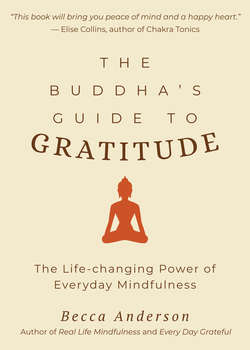Читать книгу The Buddha's Guide to Gratitude - Becca Anderson - Страница 11
На сайте Литреса книга снята с продажи.
ОглавлениеGratitude is one of the loveliest paths to personal growth. It can be subtle. After you start approaching your life with thankfulness, you may discover that you are functioning with a “half-full mindset.” For instance, maybe instead of worrying on Sunday nights about work and meetings and goals, you relax and are grateful to have work that you really enjoy. Next thing you know, your coworkers will notice that you are less stressed-out and more fun to be around, and your desk will become an oasis of positivity in the office. Your family will respond in kind, and your home will be a calmer, happier place filled with calmer, happier people. Your friends who used to call you and complain about life, now call and tell you about all the good things that are happening to them. It took a while, but eventually your aura of gratefulness took hold and bloomed.
You, my friend, have an attitude of gratitude and are making the world a better place.
Well done, reader, and please allow me to be the first to say, thank you. And I guarantee that I won’t be the last. I am a big one for setting intentions, and I do so myself every morning. I intend for you to grow and soar in your wisdom. If some of the ideas, quotes, and suggestions from the “gratitude gurus” included in this book inspire you, all the better.
Are you tired of walking around with a hole in your heart? Do you need more inspiration? Gratitude has been proven to be a key component of our own happiness. Those who think abundantly will find abundance everywhere they look. In her popular book, The Secret, Rhonda Byrne writes, “With all that I have read and all that I have experienced in my own life using The Secret, the power of gratitude stands above everything else. If you do only one thing with the knowledge of this book, use gratitude until it becomes your way of life.”
The recent buzz surrounding the power of gratitude is overwhelmingly positive. Jeffery Zaslow, a columnist for the Wall Street Journal, recently wrote that there may be a positive by-product of the troubled economic times that followed The Great Recession: a decrease in the urge to complain. “People who still have jobs are finding reasons to be appreciative. It feels unseemly to complain about not getting a raise when your neighbor is unemployed,” he wrote. “Homeowners are unhappy that home values have fallen, but it’s a relief to have avoided foreclosure.”
Indeed, gratitude is still popping up everywhere. Turn on the TV. I recently listened as a career coach on The Today Show advised job seekers to put the words, “Thank you,” in their job search tool kits, declaring that the key to distinguishing oneself from the masses is to send a thank-you note. Gratitude moves us to do all kinds of things, inspired by joy. Gratitude can help us transform our fears into courage, our anger into forgiveness, our isolation into belonging, and another’s pain into healing. Saying “Thank you” every day will create feelings of love, compassion, and hope.
